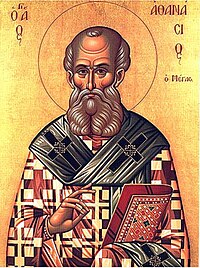Saint Athanasius of Alexandria
| Saint Athanasius of Alexandria | |
|---|---|

Icon of St Athanasius
|
|
| Patriarch of Alexandria; Saint and Doctor of the Church | |
| Born | c. 296–298 Alexandria, Egypt |
| Died | 2 May 373 (aged 75–79) Alexandria, Egypt |
| Venerated in | Eastern Orthodoxy, Roman Catholicism, Oriental Orthodoxy, Lutheranism, Anglican Communion, and among the Continuing Anglican Movement |
| Major shrine | Saint Mark Coptic Orthodox Cathedral in Cairo, Egypt |
| Feast | 15 May = 7 Pashons, 89 A.M. (Coptic Orthodox) 2 May (Western Christianity) 18 January (Eastern Orthodox Church) |
| Attributes | Bishop arguing with a pagan; bishop holding an open book; bishop standing over a defeated heretic |
Saint Athanasius of Alexandria (/ˌæθəˈneɪʃəs/; Greek: Ἀθανάσιος Ἀλεξανδρείας, Athanásios Alexandrías; c. 296–298 – 2 May 373), also called Athanasius the Great, Athanasius the Confessor or, primarily in the Coptic Orthodox Church, Athanasius the Apostolic, was the twentieth bishop of Alexandria (as Athanasius I). His episcopate lasted 45 years (c. 8 June 328 – 2 May 373), of which over 17 were spent in five exiles ordered by four different Roman emperors. Athanasius was a Christian theologian, a Church Father, the chief defender of Trinitarianism against Arianism, and a noted Egyptian leader of the fourth century.
Conflict with Arius and Arianism as well as successive Roman emperors shaped Athanasius' career. In 325, at the age of 27, Athanasius began his leading role against the Arians as a deacon and assistant to Bishop Alexander of Alexandria during the First Council of Nicaea. Roman emperor Constantine the Great had convened the council in May–August 325 to address the Arian position that the Son of God, Jesus of Nazareth, is of a distinct substance from the Father. Three years after that council, Athanasius succeeded his mentor as archbishop of Alexandria. In addition to the conflict with the Arians (including powerful and influential Arian churchmen led by Eusebius of Nicomedia), he struggled against the Emperors Constantine, Constantius II, Julian the Apostate and Valens. He was known as "Athanasius Contra Mundum" (Latin for Athanasius Against the World).
...
Wikipedia
